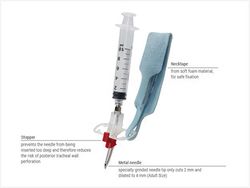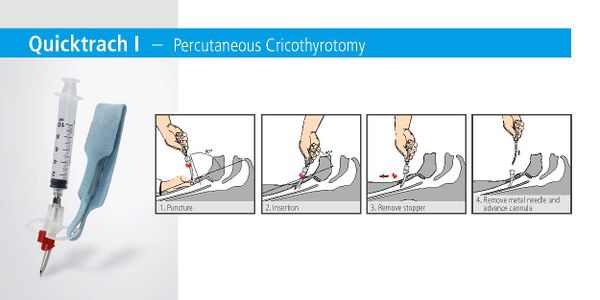Difference between revisions of "Cricothyrotomy Surgical"
Jump to navigation
Jump to search
Mfrdmanager (talk | contribs) |
Mfrdmanager (talk | contribs) (→INDICATIONS:) |
||
| Line 4: | Line 4: | ||
====INDICATIONS:==== | ====INDICATIONS:==== | ||
| − | * If unable to ventilate and airway not patent, perform Cricothyrotomy | + | * If unable to ventilate and airway not patent, perform Cricothyrotomy. |
* When an airway is needed and intubation is unsuccessful. | * When an airway is needed and intubation is unsuccessful. | ||
| − | |||
====CONTRAINDICATIONS:==== | ====CONTRAINDICATIONS:==== | ||
Revision as of 10:30, 16 September 2019
Contents
Procedure Guidelines 9.10
CRICOTHYROTOMY (SURGICAL)
INDICATIONS:
- If unable to ventilate and airway not patent, perform Cricothyrotomy.
- When an airway is needed and intubation is unsuccessful.
CONTRAINDICATIONS:
- Children under 12 years old.
- Known bleeding disorder and/or anticoagulant therapy.
- Unable to locate landmarks.
EQUIPMENT:
- Quiktrach kit (Adult or Child size)
PROCEDURE: (refer to illustrations):
- Place the patient in a supine position with the neck in a neutral position.
- Palpate the thyroid notch, cricothyroid membrane, and the sternal notch for orientation. Gather equipment.
- Prepare site with Antiseptic swabs.
- Stabilize the thyroid cartilage with thumb and 3rd finger of hand. Stretch skin taut.
- Puncture the thyroid cartilage with the device.
- Insert the Quiktrach into the trachea.
- Remove the stopper from the Quiktrach device.
- Remove the metal needle and advance cannula.
- Ventilate the patient with BVM.
- Observe breath sounds and auscultate the chest for adequate ventilation.
- Secure the Quiktrach device.
- Continue to ventilate and observe chest rise.

